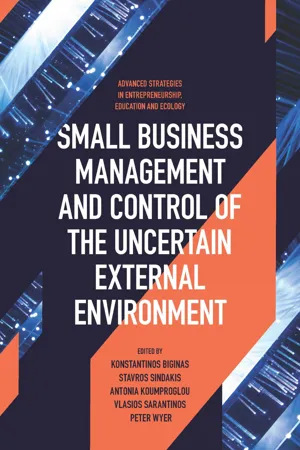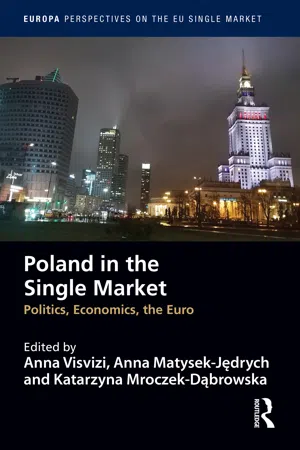Consequences of Brexit
The consequences of Brexit refer to the economic impacts resulting from the United Kingdom's decision to leave the European Union. These consequences include changes in trade relationships, potential disruptions to supply chains, fluctuations in currency values, and shifts in investment patterns. The uncertainty surrounding Brexit has also contributed to market volatility and business decision-making.
6 Key excerpts on "Consequences of Brexit"
- eBook - ePub
Brexit and the Future of the European Union
Firm-Level Perspectives
- Marian Gorynia, Barbara Jankowska, Katarzyna Mroczek-Dąbrowska, Marian Gorynia, Barbara Jankowksa, Katarzyna Mroczek-Dąbrowska(Authors)
- 2021(Publication Date)
- Routledge(Publisher)
...3 The projected effects of Brexit on the EU and the UK 1 Marian Gorynia, Aleksandra Kania, Ewa Mińska-Struzik Introduction The origins of Brexit presented in Chapter 2 lead to a broader reflection, which boils down to the following questions: What were the tendencies in international economic relations in the second half of the twentieth century and in the twenty-first century? Do these tendencies continue and are likely to continue, or do we face a period of re-evaluations and peculiar twists and turns? What are the fundamental challenges for humanity due to globalization regardless of Brexit and what impact can Brexit have on them? In what sense do contemporary processes form the Brexit’s basis and context? What does Brexit change in these tendencies? This subchapter attempts to answer these questions. The UK’s decision to leave the EU was a landmark moment for European integration. The British electorate voted to leave the EU by a 51.9% majority. The result of the referendum on Brexit organized on June 23, 2016, surprised many observers and started a series of attempts to anticipate what the consequences would be for both the British and European economies. Several institutions published model-based forecasts on the economic Consequences of Brexit, including the OECD, Oxford Economics, the Centre for Economic Performance, PricewaterhouseCoopers (PwC) and HM Treasury. Some experts, such as those from PwC, predict a slight negative impact of Brexit on British GDP, which equals 1.3% in the short term. Others, such as the researchers from the Centre for Economic Performance, predict a significant fall in British GDP in the long run, which equals 9.3%. All these institutions adopted two assumptions for the UK’s relations with the EU after Brexit. First, the UK would make a zero or lower contribution to the EU budget, depending on the state’s access to markets...
- Konstantinos Biginas, Stavros Sindakis, Antonia Koumproglou, Vlasios Sarantinos, Peter Wyer, Konstantinos Biginas, Stavros Sindakis, Antonia Koumproglou, Vlasios Sarantinos, Peter Wyer(Authors)
- 2022(Publication Date)
- Emerald Publishing Limited(Publisher)
...Once the UK opts out of the EU, the existing chains require re-configuration and re-design. All investment priorities concerning warehouses and similar would favour the pre-Brexit UK–EU relationship. If post-Brexit transaction costs of trade become too high, companies will have to recheck their existing or projected destinations in the UK (Bartels-Velthuis, Blijd-Hoogewys, & Van Os, 2011). Clearly, the nature of the deal that Boris Johnson (British Prime Minister) closed and the unfolding of the fine detail of the operational implications of that deal determines the ultimate severity of the situation. Indeed, overall impact embraces numerous aspects of the business, including the geographi cal location, trade costs, side effects of custom barriers, delay in timely delivery of materials and less availability of migrants from the EU region due to immigration laws. This emerging business environment pushes the small business to adopt a more concerted learning perspective towards identifying and understanding those areas of change relevant to it and the implications of that change (BBC, 2019). Chapters 2 and 3 of this book focus on the entrepreneurial learning capabilities and the forms of growth-achieving small businesses. The Brexit movement led to both immediate as well as the long-term impact on the economy of the UK. In context to direct result, instances of inflation can already be highlighted (which have reduced British income of small businesses by 1.3%). Alongside this, scope for investment reduced rapidly by 6%, this underpinned by a post-Brexit full of uncertainties. Long-term impact on the economy includes a reduction in real per-capita income level, and a fall in GDP by 4.5% (C. Burns, Gravey, Jordan, & Zito, 2019). At the same time, it is evident that small businesses constitute a majority of private sector businesses, resulting in a combined turnover of £1.9 trillion...
- eBook - ePub
The EU's Crisis Decade
Reflecting on EU Capitalism and Governance
- Chih-Mei Luo(Author)
- 2019(Publication Date)
- Palgrave Macmillan(Publisher)
...Carole Cadwalladr (2016), a famous Welsh writer, observes that the sense of inequality, both economic and political ones, explains the Brexit vote than the sums of other facts. Thus, Jones (2016), O’Hagan (2016), and Daran Hill (BBC, 24 June 2016d) all view the surprising outcome of Wales’ vote for Brexit as an anti-government, anti-establishment vote. Their argument of protest vote was verified by a post-referendum survey in which the majority, 53%, of Welsh voters would change to vote for Bremain if there was a second referendum. It was a 6% swing in the direction and the so-called ‘ Bregret’ votes for being cast to protest the government (The Independent, 5 July 2016f). To sum up, as the former UK representative to Taiwan, Michael Reilly, concludes, both economic rationales and political dissatisfaction explain the overall outcome of Brexit (interviewed with the author on 30 August 2016). Together with local factors in southern England, frustration and dissatisfaction of disadvantaged voters with the economic status quo in northern and eastern England and protest votes to the then Conservative government in Wales finally led to the unexpected outcome of Brexit. 4 The Implications of Brexit for European Integration The immediate impact of Brexit to the rest of the world was economic. The outcome has caused immediate downfalls in the worldwide financial markets. The IMF also cut its forecasts for global growth for 2016 and 2017 both by 0.1% to 3.1% and 3.4%, respectively, as a Brexit result, despite claiming that economic Consequences of Brexit were still unfolding (IMF, 2016 : 1–3). The chaos of financial markets could be settled and cleared after some times, but the implications of Brexit for worldwide regional integration were more enduring and challenging. What messages were delivered from Brexit and how these messages imply for European integration need to be identified...
- eBook - ePub
Poland in the Single Market
Politics, economics, the euro
- Anna Visvizi, Anna Matysek-Jędrych, Katarzyna Mroczek-Dąbrowska, Anna Visvizi, Anna Matysek-Jędrych, Katarzyna Mroczek-Dąbrowska(Authors)
- 2020(Publication Date)
- Routledge(Publisher)
...17 Brexit and its potential consequences for Poland – the perspective of Single Market principles 1 Anna Matysek-Jędrych and Katarzyna Mroczek-Dąbrowska Introduction On June 23, 2016, the citizens of the Great Britain voted to exit the European Union (EU), the so-called Brexit vote. This decision increased uncertainty and created a wide range of adverse consequences for the United Kingdom, other EU member states, and the wider region overall. A vote for Brexit could be perceived as a starting point for the third European crisis, following the euro zone debt crisis and the migration issue. The result of the referendum generated, above all, quite a large shock to the British economy. Nevertheless, for remaining EU member states, Brexit is not a zero-sum game, and this will impact each state to varying degrees. The strength of impact depends, among others, on the scale of investment and trade expositions to the United Kingdom, political channel and new regulatory dynamic with the UK as a non-EU member state. Although at the end of January 2020 Brexit became a fact, the final arrangements of the ‘divorce’ have not yet been set. In October 2019 the EU and the UK signed a Political Declaration that is supposed to become a framework for future relations. However, the Declaration remains vague, and it lacks support in any tentative numbers. It is therefore quite safe to say that all options are still on the table. Although Brexit is now a done deal, the number of supporters and opponents of Brexit seems still to be nearly equal, and arguments for both groups strongly relate to geopolitical and social – in some cases extremely populist – fundamentals...
- eBook - ePub
Against European Integration
The European Union and its Discontents
- Ivan T. Berend(Author)
- 2019(Publication Date)
- Routledge(Publisher)
...In the late fall of 2018, close to the deadline, the Consequences of Brexit are frightening. Brexit poses a severe challenge for the EU as well. According to the IMF, a “no-deal Brexit” could create economic pain across Europe with no winners. Ireland could lose 4 percent of its GDP; the Netherlands, Denmark, and Belgium could lose 1 percent. 12 More importantly, the EU would lose political strength, necessary budget funds, and the prestige associated with an alliance with one of the strongest countries in Europe (and the world). On the other hand, the real loser of such an outcome would be Britain. The British pound lost 12 percent of its value against the euro compared to what it was just before the EU referendum. According to initial estimates by the British government, leaving the advantages of EU membership behind would cost the UK’s businesses about £65.5 billion per year (or $82 billion). Over a 15-year period, this would lower the country’s GDP by 5.4–9.5 percent. Analysts also believe that the UK would find it difficult to replace the lost trade revenue from the EU, which has a consumer market of around 500 million people and a GDP of around €12 trillion. About 44 percent (or £220 billion of £510 billion) of the UK’s exports currently go to EU countries. Export trade with the EU accounts for about 12.5 percent of UK’s GDP, while the EU’s trade with Britain amounts to only about 3 percent of the EU’s GDP. 13 Exhibiting typical Brexiter delusions, both UKIP and several influential members of the Tory Party have called for a Commonwealth Free Trade Agreement that would replace EU trade by expanding trade within the Commonwealth and the broader Anglosphere. The Financial Times warned about the “British illusion of Commonwealth trade after Brexit...
- Juan Santos Vara, Ramses A. Wessel, Juan Santos Vara, Ramses A. Wessel(Authors)
- 2020(Publication Date)
- Routledge(Publisher)
...The author proves that the early steps taken by the authorities in London have focused merely on rolling-over pre-Brexit agreements. The analysis of 20 agreements concluded thus far proves that EU agreements have not only served as a point of departure for post-Brexit deals, they have been either directly or indirectly copy–pasted into UK agreements with third countries. As explained at the beginning of this introduction, Brexit has important implications for the relationship between the EU and the UK with other states and international organizations. Part III of the handbook aims to explore the impact of the withdrawal of the UK from the EU on the participation of these actors in other international organizations and in EU diplomacy itself. Gregory Messenger analyses in Chapter 10 the relationship between the UK and the EU at the WTO. In identifying the core legal questions arising from UK withdrawal from the EU for trade relations at the WTO, Messenger looks to possible areas of cooperation and disagreement for both parties, challenging expectations that they will fall into either a dynamic of confrontation or subservience. Instead, he argues that the experience thus far, and the priorities for the future, set the ground for a relationship built on constructive creative competition. In Chapter 11, Jan Wouters focuses on the implications of Brexit for the functioning of the United Nations Security Council (UNSC) from the perspective of the EU. He outlines the importance of the UK’s permanent seat in the context of the Brexit debate, both from the viewpoint of the UK and from the EU and its 27 Member States. Wouters explores what as of now has been agreed about the UK and EU’s future relationship within the UNSC, in particular in the ‘Political Declaration setting out the framework for the future relationship between the European Union and the United Kingdom’...





